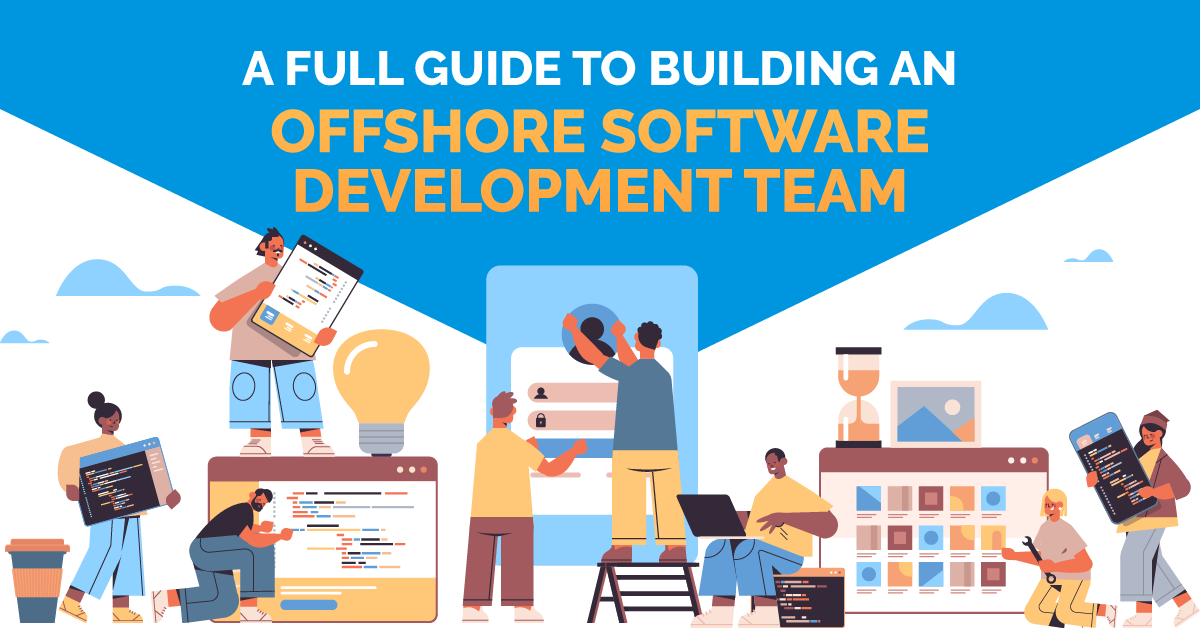As global economic and social realities transform, more businesses consider offshoring a viable solution to stay ahead of the competition. Companies leverage the highly-qualified talent pool, lower operational costs, and modern technology associated with offshore development. Partnering with the best offshore teams can ensure successful and sustainable projects.
Software development teams are one of the most common business functions offshored due to the tasks involved, which are tedious and take up too much time and resources when done in-house. Several business giants and promising start-ups maintain their potency by turning to software developers from countries like the Philippines to augment their staff.
Create an environment where both onshore and offshore employees feel safe and comfortable working together with strong company culture. Check out this infographic if you’re planning on building an offshore software development team.
What Can Offshore Development Teams Do?
Deciding to delegate your company’s software development function to an offshore team is a big step and a somewhat daunting task for many business owners. However, knowing what these developers can do to boost the company’s operations can ease the doubts surrounding the decision. Here are some of the critical tasks behind a successful digital project.
- App Development
App developers create mobile solutions to address market needs, strengthen brand identity, and support business expansion. Many booking, marketplace, delivery, and taxi apps that people use today exist because of offshore software development teams. Apart from coding and testing the prototype, post-launch activities like bug fixes, software updates, and additional content can also be done by the team
- Web Development
Offshore software developers also produce browser-based applications for their business’s online presence. They build and maintain both the app’s front- and back-end as they are well-versed in different coding languages and operating systems.
- QA Testing
One of the pillars of a successful software product or service is meeting minimal issues. However, it is time-consuming and needs specialist tools and software to do.
Offshore QA testers can ensure that consumers get a high-quality product with the best user experience. They can pinpoint bugs that slow down the system, discover underlying software vulnerabilities, and suggest improvements for an exceptional final product.
- UI/UX Designing
A User Interface/User Experience (UI/UX) design team is tasked to provide users with enjoyable and meaningful experiences by making an intuitive layout. They’ll develop an easily navigable software or app with an intuitive interface that will give the users a good experience and hopefully return for more.
Why Offshore?
Most of the time, it’s challenging to find local IT workers who fit a company’s budget and requirements. The stiff competition in the industry amplifies this, which prompts businesses to consider offshoring, but here are other reasons why it is a viable solution.
- It’s cost-effective
There are a lot of financial considerations when hiring in-house staff, such as benefits, insurance, infrastructure, and higher wages. When you transfer your software development projects to offshore locations with lower living costs, you can effectively reduce your overhead while increasing your capacity.
- Instant access to specialized skills, tools, and resources
Offshore software development teams are usually made up of highly experienced and technically proficient practitioners who can come in immediately once the contract is signed. This can help your project along the offramp to launch.
- Highly scalable and flexible
Since developers can start quickly with little increase in overhead, they easily scale up operations. Moreover, scaling back is also a lot easier than when dealing with in-house teams.
- Core team can do more important tasks
Say that you have an established brick-and-mortar brand that wants a software of its own. If your organization is not geared towards software development and no such infrastructure exists in your company, it may be wiser to delegate this task to offshore software developers.
Knowing that specialists manage the tech side of the business, owners will be confident to pursue other essential business endeavors like sales, marketing, and business development.
7 Steps to Build an Offshore Development Team
Now that you’ve finally decided to give offshoring a try, you may check out the following steps to help you get started.
- Establish a clear vision of your project
All software projects must begin with an outline of the company’s goals, general features for the software, and the deliverables with specific timeframes. Avoid setting vague goals, and remember to keep them SMART: Specific, Measurable, Achievable, Relevant, and Timely. List down the required skillsets for every role and the budget for each stage. Make sure to account for the post-launch duties, as well.
- Search for offshore staff solutions services
Look for a recruitment agency in the Philippines that matches the brand’s vision and can deliver services according to your project’s requirements. The outline you made can help the agency find the most qualified staff who falls within your budget and required level of expertise.
Scour the web for reviews and recommendations for such companies and review their experience and track record. More often than not, they will give you your money’s worth with fewer surprises along the way.
- Make sure their methodologies are compatible with yours
The offshore team must be well-versed with project management methods such as Scrum, Waterfall, Agile, or Lean and that they are aligned with yours to ensure that you can work together smoothly. Monitoring progress and communicating and collaborating even from a thousand miles away will be easier if you and your offshore team use the same methodology.
- Setup policies and guidelines
Your offshore team should be treated as an extension of your team, not third-party contractors. The company and the offshore software development team need to be on the same page regarding deadlines, standard operating procedures, reporting protocol, and other policies.
Be specific about every detail to avoid misunderstandings. Remember your Monday may be their Sunday or Tuesday, so it is essential to be clear and concise.
- Invest in equipment and infrastructure
Use the best hardware to help offshore and onshore teams organize, share, collaborate, and monitor the project’s progress with minimal glitches. Invest in a time-monitoring app and an internal communication platform.
- Facilitate onboarding and training
Draft a training plan to ensure offshore teams are well-integrated into the in-house team. Use onboarding and training sessions to inject company culture and values. Make them feel they’re part of the family even if they’re not in the “house.”
- Establish a transparent and open line of communication
Create a system where offshore teams can easily and instantly communicate with key personnel and project stakeholders. Checking in regularly, even just to ask how they’re doing, can make the team more confident in reaching out to their in-house counterparts.
Must-have Characteristics of an Offshore Software Development Service Provider
- Impeccable track record
In Manila alone, there are thousands of offshore staffing providers. One of the best ways to pick the best from the crowd is by probing their track record. Ask other companies for referrals and scour the internet for reviews. Check their website for industry awards and testimonials from satisfied clients.
- High English proficiency
According to the 2021 English Proficiency Index, the Philippines is the second highly proficient country in Asia, making it competitive in the global workplace. Being able to express oneself and explain concepts in English fosters clear communication.
- A skilled and specialized talent pool
Software development is all about applying special skills to finish a project. “Fake it ’til you make it” does not apply to this discipline. Choose service providers with certified, experienced, and highly-trained specialists in the IT industry.
- Culturally compatible
Finding a provider that matches your culture and values can foster empathy and a deeper understanding of what makes each other tick. Filipinos are adaptable to many different cultures; they are highly compatible with Western culture, and with firm Asian roots, are compatible with Eastern culture as well, which is an excellent foundation for you to build on to make them and your in-house team work well together.
- Great value for money
Great value does not necessarily mean the cheapest. Get a service provider who can provide you with the best staff to suit your needs within the shortest time possible. A recruitment service that is transparent and delivered by a certified, professional recruiter in the Philippines is also a welcome bonus.
Dive into the Exceptional Offshore Talent Pool Today
The economic and social climate, not to mention consumers’ needs, change rapidly, so organizations need to keep up. One of the most feasible and cost-effective solutions to be globally competitive is to build an offshore software development team.
It can provide your company with high-quality web and app development services, QA testing, UI/UX design, and many other tech services. You’ll also reap several offshore software development benefits, such as flexibility and scalability.
Building your offshore team can be challenging, especially if you’re just starting. Manila Recruitment can ease your worries and provide you with top-notch hiring services. Before you know it, your app or website will be up and running, making people’s lives easier.















